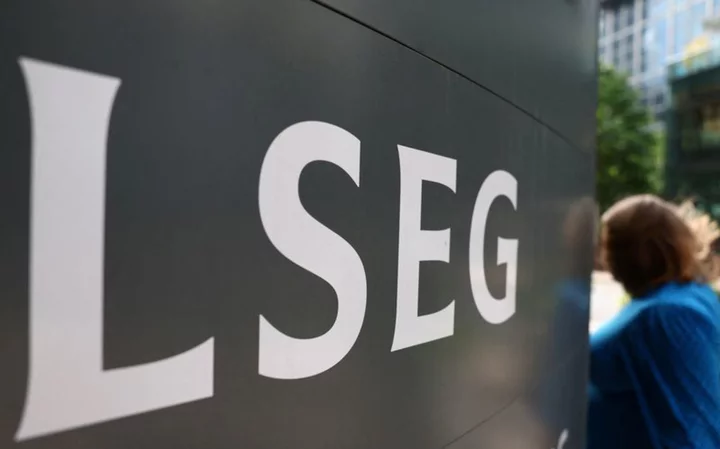By Naomi Rovnick
LONDON Long-term gloom about Britain's economy appears to be lifting and some big investors reckon the end of extreme pessimism is near, with gains ahead for UK-focused businesses and the more international but long-shunned FTSE 100. After years of outflows and big companies such as materials group CRH moving stock listings overseas, the UK's FTSE All Share index is valued at around 2.28 trillion pounds ($2.84 trillion). That's roughly the same as a single U.S. stock, Apple, while British companies are trading at around a record discount to global equities.
High government debt, crumbling infrastructure, political turmoil and 14 rate hikes since late 2021 have hurt sentiment.
Yet, the economy has not entered recession as feared and official statisticians have sharply upgraded data to show the UK recovered earlier from COVID-19 than previously thought.
UK-based investors said they are increasing holdings of domestic businesses and taking advantage of low valuations for the FTSE-100.
"It feels like we've passed the peak of pessimism about the UK," said Daniel Lockyer, senior fund manager at 7 billion-pound investment and advice group Hawksmoor Investment Management, which increased its exposure to UK companies in August.
"We don't necessarily need to see a huge bout of positive news, but the trend of negativity is slowing and the key to making money in any market is to get in at the bottom and capture the start of a turnaround."
UNDERPERFORMER
A cumulative 76 billion pounds has flowed out of UK equity funds since 2016, data provider Morningstar said, with the bulk of outflows in the last three years. Global equity funds tracked by Morningstar have had 507 billion pounds of net inflows since 2016.
UK pension funds, enticed by better returns overseas, have cut allocations to UK equities to 6% from 53% 25 years ago, according to think tank New Financial.
Still, there are bright spots.
While the domestically focused FTSE 250 share index has dropped for four out of the last six months, the FTSE 350 sub-index of leisure stocks has gained 18% year-to-date.. A UK retail stocks index is up 23%.
Consumer stocks are outperforming as investors bet on the UK cost of living crisis becoming less intense.
"The outturn for the UK economy will be and is better than the markets expected," said Invesco's head of UK equities Martin Walker, adding that his portfolio was now modestly overweight UK consumer staples for the first time in many years.
The FTSE 100, trading on a price-earnings ratio of 10.5 times compared to 12.5 times for the wider Stoxx Europe 600, presented "a real opportunity because you are buying (its companies) at a discount," Walker said.
Economists polled by Reuters expect the UK to eke out 0.3% growth this year, trailing the euro zone but a big contrast to late 2022, when many forecast recession.
The Bank of England is expected to hike rates again this month, exacerbating stress for homeowners due to the refinancing of fixed-term mortgages at higher costs.
WAGES
But after UK households endured the biggest inflation shock for four decades and a cost-of-living crisis, wages are now growing faster than prices. Energy bills are expected to drop to a two-year low next month.
Pay rises, said Pantheon Macroeconomics Chief UK Economist Samuel Tombs, mean British households can "maintain their current level of real expenditure under any plausible scenario for official interest rates."
Leigh Himsworth, UK fund manager at Fidelity International, said he was "trying to pick off UK retailers we can buy", while it was also "time to pick up some of the (UK) real estate sector."
Discount chain Wilko has collapsed under the pressure of the cost-of-living crisis but stronger businesses are seeing improvements. Marks & Spencer, a bellwether of UK discretionary spending, has lifted its annual profit forecast.
Neil Birrell, chief investment officer at fund manager Premier Miton, said he has raised the proportion of UK stocks in his multi-asset portfolios to the highest since 2019, with a bias towards consumer businesses.
But while noting good economic reasons to call an upturn for UK stocks, fund managers also stressed the need for further steps from policymakers to revive interest in British equities.
Premier Miton is lobbying policymakers to introduce a new tax-efficient investment vehicle for UK stocks. Himsworth, at Fidelity, suggested a new national savings product that could provide capital to British businesses.
Savvas Savouri, London-based partner and chief economist at 4.5 billion pound hedge fund Toscafund, said quality UK companies do not have a strong enough domestic investor base.
"UK equities have been an abject failure," he said. "We have de-equitisation because we don't value our companies."
($1 = 0.7990 pounds)
(Reporting by Naomi Rovnick; editing by Dhara Ranasinghe and Sharon Singleton)

